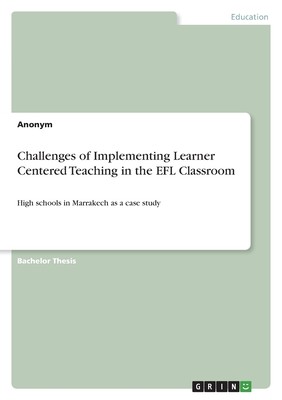
- We will send in 10–14 business days.
- Author: Anonym
- Publisher: GRIN Verlag
- Year: 2022
- Pages: 62
- ISBN-10: 3346740013
- ISBN-13: 9783346740014
- Format: 14.8 x 21 x 0.4 cm, minkšti viršeliai
- Language: English
- SAVE -10% with code: EXTRA
Challenges of Implementing Learner Centered Teaching in the EFL Classroom (e-book) (used book) | bookbook.eu
Reviews
Description
Bachelor Thesis from the year 2022 in the subject Pedagogy - School Pedagogics, grade: 16, language: English, abstract: Calls for a transition from traditional English teaching methods to innovative methods have been raised in recent decades. There is now a significant movement in instruction from teacher-centered to learner-centered, which is reinforced by the communicative strategy of language teaching. Because traditional teaching pedagogy in languages failed on meeting the expectations of educational institutions as well as those of students, there is an emergent need to replace it with an approach to teaching which must be able to equip learners with the necessary tools to manipulate the content as well as to develop their oral competencies in the English language, instead of just assigning students to store information and to memorize grammatical rules. Students are now expected to be actively engaged in the learning process. In order to do so, students need to be able to speak fluent English so that they can interfere in their learning and have productive participation in the classroom. Specifically, rather than being passive receivers of information, students ought to be actively involved in their education. What is more, to help students understand and apply what they have learned, the teacher's job description should go from being a knowledge provider to being a facilitator, and it is his responsibility to address their needs, facilitate effective assessment, and motivate students to adjust to a new approach to learning. Although, research suggests that a learner-centered approach leads to better outcomes than traditional teaching methods. The approach faces significant barriers to implementation in some countries. In Morocco, for example, instructors teaching English find it an exercise in futility to use learnerÃcentered teaching in an EFL classroom. As a result, the present research will focus on the various challenges limiting the implementation of
EXTRA 10 % discount with code: EXTRA
The promotion ends in 21d.12:45:31
The discount code is valid when purchasing from 10 €. Discounts do not stack.
- Author: Anonym
- Publisher: GRIN Verlag
- Year: 2022
- Pages: 62
- ISBN-10: 3346740013
- ISBN-13: 9783346740014
- Format: 14.8 x 21 x 0.4 cm, minkšti viršeliai
- Language: English English
Bachelor Thesis from the year 2022 in the subject Pedagogy - School Pedagogics, grade: 16, language: English, abstract: Calls for a transition from traditional English teaching methods to innovative methods have been raised in recent decades. There is now a significant movement in instruction from teacher-centered to learner-centered, which is reinforced by the communicative strategy of language teaching. Because traditional teaching pedagogy in languages failed on meeting the expectations of educational institutions as well as those of students, there is an emergent need to replace it with an approach to teaching which must be able to equip learners with the necessary tools to manipulate the content as well as to develop their oral competencies in the English language, instead of just assigning students to store information and to memorize grammatical rules. Students are now expected to be actively engaged in the learning process. In order to do so, students need to be able to speak fluent English so that they can interfere in their learning and have productive participation in the classroom. Specifically, rather than being passive receivers of information, students ought to be actively involved in their education. What is more, to help students understand and apply what they have learned, the teacher's job description should go from being a knowledge provider to being a facilitator, and it is his responsibility to address their needs, facilitate effective assessment, and motivate students to adjust to a new approach to learning. Although, research suggests that a learner-centered approach leads to better outcomes than traditional teaching methods. The approach faces significant barriers to implementation in some countries. In Morocco, for example, instructors teaching English find it an exercise in futility to use learnerÃcentered teaching in an EFL classroom. As a result, the present research will focus on the various challenges limiting the implementation of


Reviews